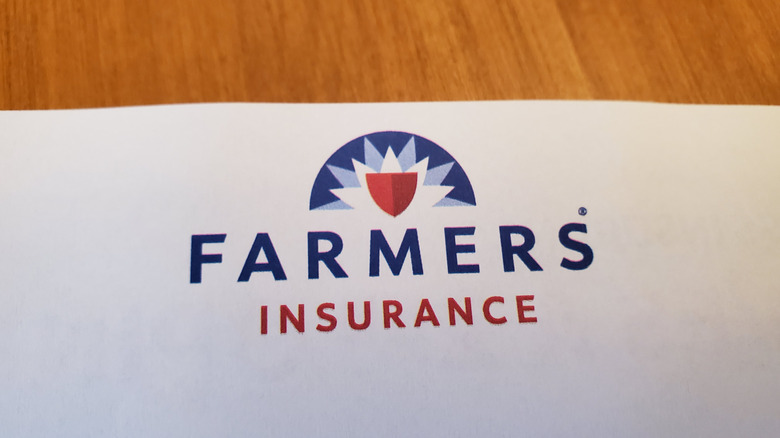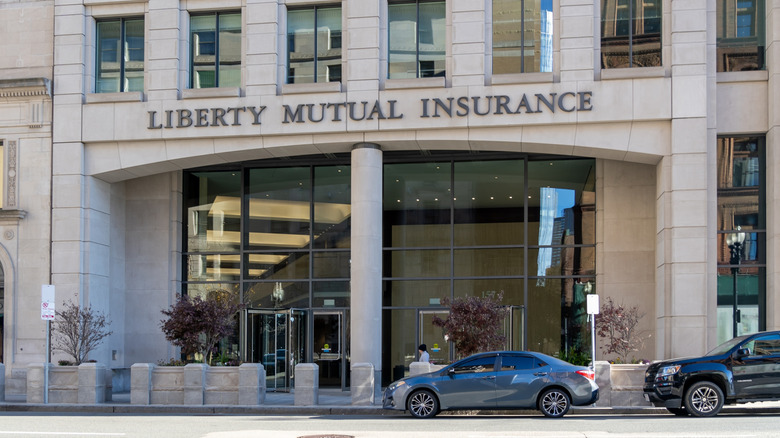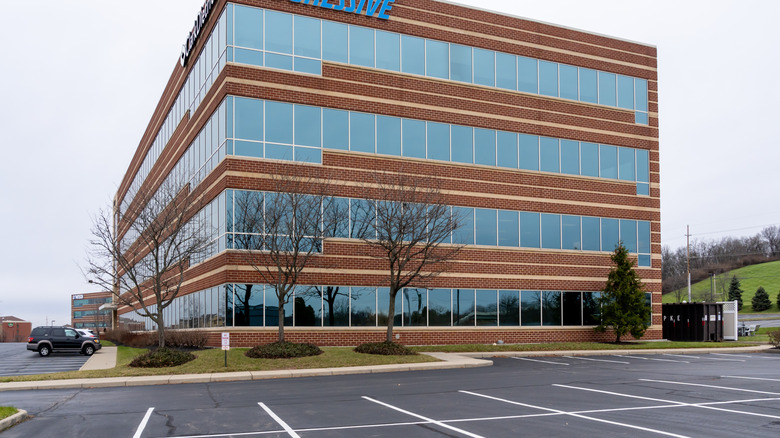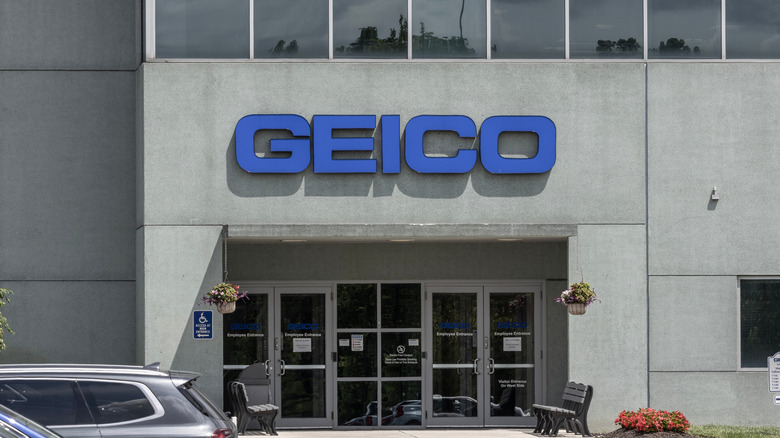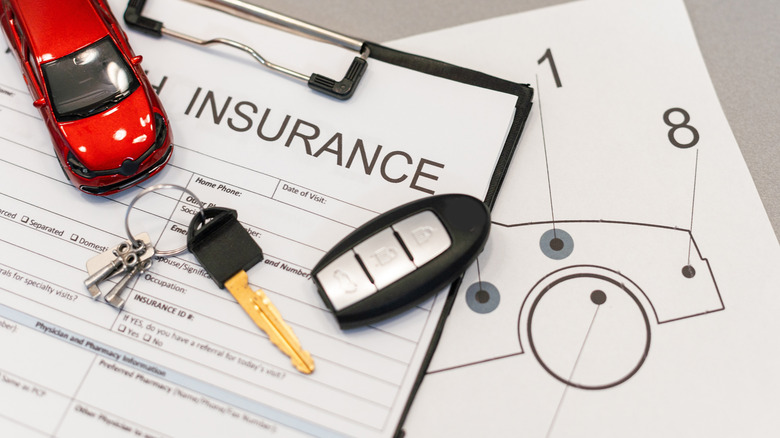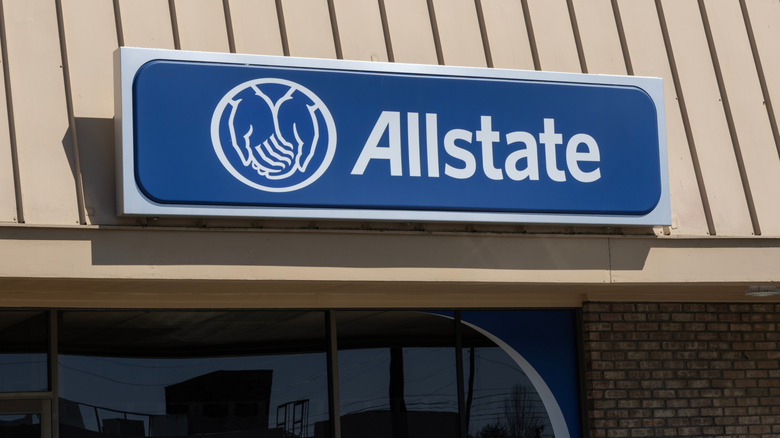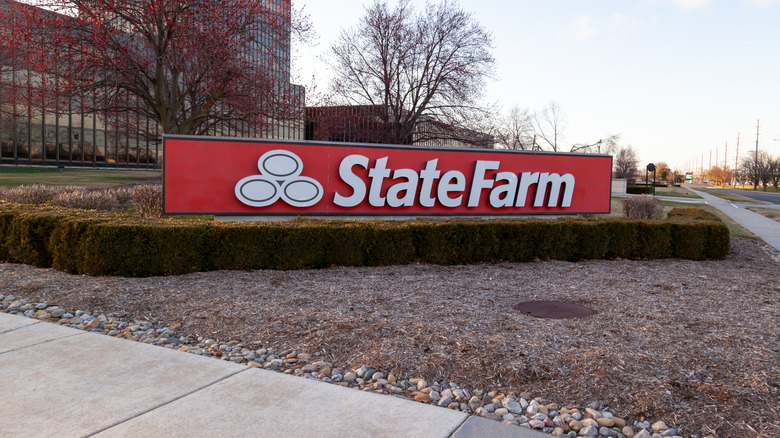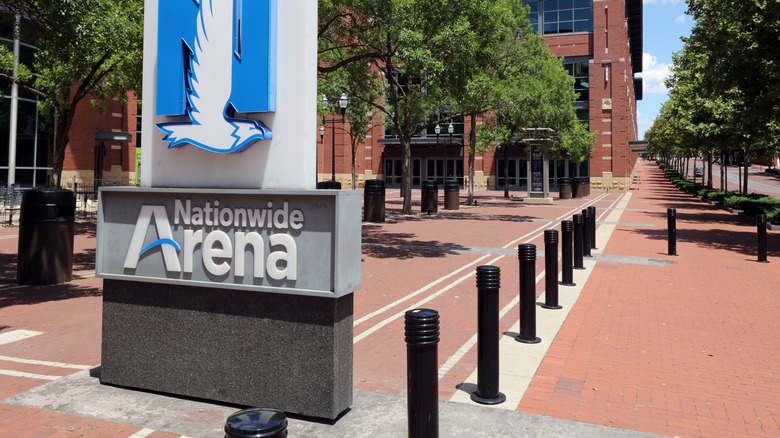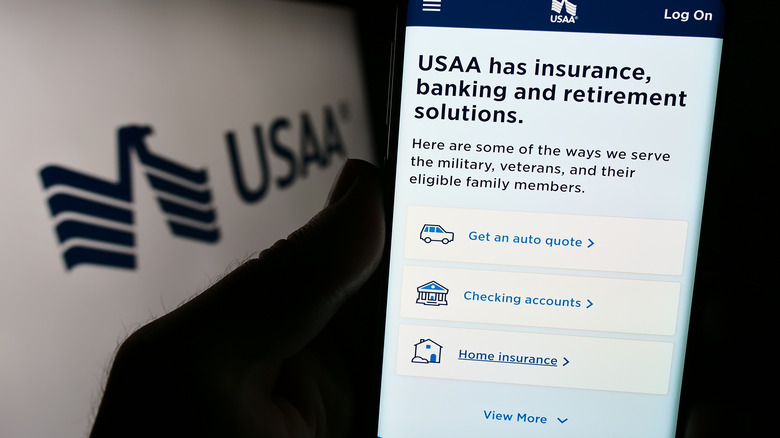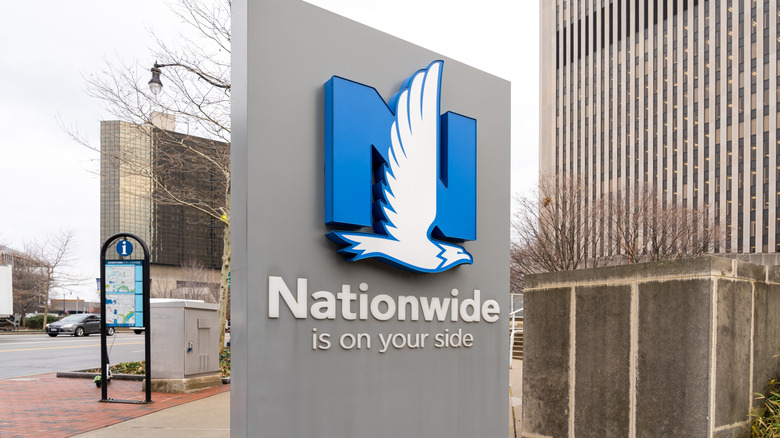Every Major Car Insurance Company Ranked Worst To Best (According To Consumer Reports)
Shopping for car insurance can be a real bummer. Rates depend on a variety of factors, including your driving record, location, marital status, and age, so cross-shopping between them can be a hassle. In addition, each auto insurance company has its own set of policies that are written in legalese, making them difficult for consumers to fully understand. Of course, it is a necessary thing to have. It's against the law to drive without some form of car insurance and in the event of an accident, having liability protection can make the recovery process much easier.
So, which car insurance company should you go with? Drivers have been trying to answer that question for decades. No one can definitively tell you what kind of car insurance to get, but some recommendations can certainly help nudge a person in the correct direction. That's what Consumer Reports aims to do with its car insurance ratings. Consumer Reports rates each U.S. car insurance company on a scale from one to 100 to see which ones have the friendliest rates, policies, claims procedures, and overall coverage. After all, a person's experience with their auto insurance company can vary wildly, so looking at a handful of reviews may not always tell the full story.
Consumer Reports bases its ratings on information gathered from over 50,000 reports from 40,000 consumers between 2019 and 2024 regarding insurance companies both big and small. To help pass along the information, we'll outline how Consumer Reports rated the 10 largest auto insurance companies in the business.
Farmers Insurance (CR Score - 38/100)
Of the 10 largest car insurance companies, Farmers Insurance currently holds the lowest score with Consumer Reports with a rating of 38 out of 100. Consumer Reports lists premiums and overall coverage as the weak points for Farmers with scores of one and two out of five, respectively. Meanwhile, Consumer Reports grades the company's claims and policy clarity as merely average. At a full score of 38 out of 100, it puts Farmers in the bottom three in terms of overall rankings.
Some of the criticism is warranted. Reviews of the service show that Farmers does have higher than average base rates than most other competitors and ranks toward the bottom in most ranked lists that we found for the same reasons. It seems the key with Farmers is to get the most possible discounts to bring those higher rates down. Farmers has quite a few of them, including Signal, the company's app that collects data on how you drive. Farmers also has a variety of extras and add-ons that help increase the price even more. Overall, if you don't qualify for a lot of the discounts and add a bunch of add-ons, you're in for some fairly expensive car insurance.
The good news is that if you get into an accident and need to file a claim, Farmers isn't any better or worse than average at dealing with them and their policies are on par with most other insurers in the industry.
Liberty Mutual (CR Score - 39/100)
Liberty Mutual is one of the older insurance companies on the list at over a century old. Despite its long-term success, it's not ranked very well by Consumer Reports. Much like Farmers, Liberty Mutual scores very low in premium prices and overall coverage with a one and two out of five rating, respectively. Similarly, like Farmers, Consumer Reports ranks the claims process and policy clarity as merely average. It does edge out Farmers, however, with a 39 out of 100 rating, putting it in the bottom five overall at Consumer Reports.
The issue seems to be the same as Farmers. To get good rates, you have to nickel and dime your way down to one by either applying for discounts or being eligible for existing ones. Otherwise, premiums can be higher than average. In addition, every review we read shows that Liberty Mutual fields a larger-than-average amount of complaints, resulting in lower-than-average customer satisfaction ratings. Many customer reviews say that the insurance company isn't too bad, but consistently fluctuating rates and the company's unwillingness to match existing customers' rates to new customer rates have left a sour taste in the mouths of many customers.
On the plus side, Liberty Mutual does have a number of available discounts, especially if you bundle multiple types of insurance. RightTrack, the company's telematics app, is among the largest giver of discounts at Liberty, offering up to 30% discounts for people who drive with a light foot.
Progressive Insurance Group (CR Score - 41/100)
Progressive is one of the big four when it comes to car insurance in the U.S., so it's a bit surprising to see them so far down on the list. However, as we'll see, most car insurance companies score between 40 and 50 out of 100 on this list, so Progressive is ranked on the lower end of competitive. Consumer Reports says that Progressive preforms average in its policies, claims, and overall coverage. However, a low one out of five rating for its premium costs hold the large insurance provider below most of the rest of the field.
That said, reviews don't quite corroborate Consumer Reports' claims as much as Farmers or Liberty Mutual. In fact, Progressive has some of the lowest rates available for folks with DUIs or accidents on their records. Drivers with cleaner records do get higher rates than average, so that's likely where the one out of five rating from Consumer Reports comes from. In terms of everything else, Progressive is competitive with the rest of the field. It has a solid digital experience, a reasonably competitive claims department, and decent coverage.
Like everyone else, Progressive also has a bunch of discounts available that can lower your payments. One way is with Progressive's Snapshot, the company's long-running telematics system that can be done through an app or a device.
Geico (CR Score - 42/100)
Geico is another one of the big four and it's not any better or worse than Progressive. Consumer Reports ranks Geico as a 42 out of 100 and it has identical ratings as Progressive. It's merely average in its claims, policies, and coverage while scoring an abysmal one out of five on its pricing. You can find some real horror stories online about Geico's rate hikes, with some folks getting saddled with massive increases. It seems fairly ordinary for customers to see large rate increases for no discernible reason.
What's disappointing is that Geico's new customer experience is much better. Most reviews cite Geico as having some of the best introductory insurance rates of any auto insurance provider in the U.S. It seems that Geico falls right into Consumer Reports' observation of companies not treating their long-time customers as well as they do new customers. Geico has also been praised for its digital-forward approach and its generous discounts to younger drivers and government employees. However, it seems normal folks are eventually asked to pay the piper.
Geico does offer tons of discounts, though, and has a competitive telematics program with its DriveEasy platform. However, much like Progressive, the longer you stick around, the worse things get. This seems to be par for the course, though, and not unique to Geico.
Travelers Group (CR Score - 43/100)
Travelers Group isn't the biggest insurance game in town, but it still competes with the big dogs. Consumer Reports has Travelers at a 43/100, edging out Progressive and Geico by a thin margin. Despite the minor score difference, Travelers has the same overall ratings as the two auto insurance juggernauts. Consumer Reports says that the claims, coverage, and policies of Travelers are par for the course while the premium prices are a dismal one out of five.
The issue is the same as Geico and Progressive. People get drawn in by Travelers' lower than average introductory rates before rate hikes hit as the customer stays longer. This doesn't seem to be indicative of just the auto insurance portion of Travelers' business. We found examples of auto, homeowner, and renter's insurance going up by 40% to 74%. One Redditor shared an increase of 60% to their auto policy, which is similar to what we found when searching for Progressive and Geico customers. So, while the insurance company's services work well, it seems Consumer Reports has properly pegged Travelers as another company that'll suddenly raise your rates.
If you can get in on a good plan and don't experience the hikes, Travelers is otherwise a competitive auto insurance company. Its IntelliDrive telematics service can save you up to 30% for good driving manners, which is higher than average. It also offers plenty of other discounts if you can qualify for them.
Allstate Insurance (CR Score - 43/100)
Allstate Insurance is rated identically to Travelers Group by Consumer Reports. The company scores a 43 out of 100, making Allstate the second highest rated auto insurance company of the big four with only State Farm scoring higher. Consumer Reports has the same issues with Allstate that it has with Travelers. Allstate has fairly average claims, coverage, and policy clarity but scores a one out of five on its prices. Despite being rated slightly higher on the 100-point scale, it measures identically to Progressive, Geico, and Travelers in the five-point scale from Consumer Reports.
It's also much for the same reasons. Allstate's rates are higher than the national average as of 2024 and the company isn't shy about hiking prices up on existing customers. They also tend to charge younger customers more than older ones and aren't as friendly to folks with prior violations. Customers can counter some of those rate hikes with various discounts, such as using the company's Drivewise telematics platform. Reviewers have also praised Allstate for its various types of coverage since it has more options than many competitors. Still, it's hard to swallow those premiums, especially when they increase by a lot.
Since its ratings from Consumer Reports is virtually identical to Progressive, Travelers, and Geico, you can likely expect a similar experience between any of the four companies without tons of variance between them. In general, it may be a good idea to swap insurance companies periodically to get the new customer rates since the experiences are roughly the same either way.
American Family Insurance (CR Score - 44/100)
American Family Insurance is a smaller insurance company but is well-known enough to compete with the big companies. Consumer Reports gives American Family Insurance a 44 out of 100 rating, which is marginally better than Allstate and Travelers. However, despite its slightly higher score, it still has the same issues. Claims, coverage, and policy are all about average while the premium pricing is rated at a one out of five.
In general, the biggest gripe most folks have about American Family Insurance is the inevitable rate increases. If you take those complaints away, reviews of American Family Insurance are actually quite good. They come in below average for rates for teenagers but climb above average for folks in their 20s and 30s. Then it dips back below average for older people. They also offer a wide range of discounts and have fairly responsive customer service. The biggest detriment is that they're only available in a handful of states, which means they can't match the wide coverage of companies like Geico and State Farm.
Based on the reviews, American Family Insurance may be a little underrated on this list. Granted, they do increase prices like all the other insurance companies, but we found more positive reviews than negative for the other aspects of the company's business.
State Farm (CR Score - 49/100)
State Farm has the distinction of being the highest rated of the top four insurance companies on Consumer Reports list, albeit with a very lukewarm 49 out of 100 rating. Like its closest competitors, Consumer Reports gave State Farm a one out of five for its prices, so that part is on the same trend. However, State Farm's claims score is a bit higher than all of the other companies on the list so far, indicating that consumers felt that State Farm took better care of them than competing companies. Even so, 49 isn't all that much higher than other large competitors so the actual experience isn't hugely different.
State Farm openly acknowledges that it raises rates on people and has a whole webpage to explain some of the reasons why. Rates seem to be less impactful than some other companies with most rate increase complaints we found sitting at around 20%. Given that some companies can nearly double people's premiums for no apparent reason, 20% is less bad than others. Most of the rest of the complaints we found were customer service related.
There are some perks to State Farm, though. The company has two safe driving programs. One is the Drive Safe & Save, which is State Farm's telematics service. The other is Steer Clear, a telematics service aimed at drivers under 25. Both will save you money on premiums.
Nationwide Insurance (CR Score - 49/100)
Nationwide Insurance is rated identically to State Farm. Consumer Reports gives it a 49 out of 100 rating, which puts the company in the top half of the list. Once again, the weakness here is the company's premiums while its strength is its claims department, which scored a four out of five. Policy and coverage were rated as average, just like State Farm. In short, per Consumer Reports, the only real issue is the usual rate hikes.
Nationwide's rate increases aren't as bad as some others. Nationwide's insurance premiums have gone up 29.5% since 2018, which is less of an increase than some competitors. Some have reported as much as 25% rate hikes in a single year. Aside from that, Nationwide seems to be a solid overall option. You can get discounts with the company's SmartRide program, although reviewers note that Nationwide has less effective discounts available than most competitors. It also has lower full coverage monthly costs than the national average, which helps offset the lack of discounts. They also tend to charge people more with prior auto incidents than competitors.
Nationwide doesn't service every state. Alaska, Hawaii, Louisiana, and Massachusetts customers can't get Nationwide. Otherwise, it has the same downfalls and upsides as most other insurance companies. It just does slightly better than most others.
USAA Group (CR Score - 68/100)
USAA is an interesting case. You can only get USAA if you or an immediate family member has prior military service, so the clientele is more limited than any other insurance company on the list. With that said, those who do get in have a treat coming as far as Consumer Reports is concerned. USAA scores a 68 out of 100, which puts USAA in the top five in the entire report and the best rated of the top 10 insurance companies. USAA scores marginally better on its prices versus the rest of the competition while scoring solid in all other categories, put it a step above the rest.
While the rating is much higher, you can still see some of the same old stuff here. There are stories of USAA customers seeing large rate hikes, although they seem to occur less frequently than from other insurance companies. Even so, USAA still comes in well below the national average when it comes to premiums in every age range. You can get additional discounts with SafePilot, USAA's telematics program along with more discounts if you bundle other policies.
While all insurance companies offer discounts, USAA seems to do it a bit better. If you search for stories about it online, there are invariably people who will talk about how they've had USAA for decades and you just don't see that many people saying that about other insurance companies. It has its problems and it's far from flawless, but it still seems like a step above the competition.
Methodology
Fortunately, a lot of the work identifying the largest car insurance providers has already been done. For this list, we've focused on the 10 companies with the highest market share. According to MarketWatch data, only four auto insurance companies control more than 10% market share in the industry: State Farm (18.31%), Progressive (15.24%), Geico (12.31%), and Allstate (10.37%). From there, the next six largest companies include USAA (6.27%), Liberty Mutual (4.20%), Farmers Insurance (4.18%), American Family Insurance (2.14%), Travelers (2.08%), and Nationwide (1.71%). As you can see, companies go from popular to barely moving the needle pretty quickly.
To order our list, we've simply gone down the line based on how Consumer Reports rated each company. We've considered about each company and how they were rated to give some context as to why they might have been rated that way. In general, Consumer Reports lists a number of things in its Car Insurance Buying Guide that all contribute to the ratings. Consumer Reports rates each company out of 100 and then rates individual metrics like premiums, policy, claims, and overall coverage out of five, so were talking about two different sets of Consumer Reports rankings in this list.
Other than that, the list is pretty self-explanatory. We didn't mess with Consumer Reports' data in any way. There are a couple dozen auto insurance companies on Consumer Reports' full list of Car Insurance Ratings, so there is more information there if you want it.

